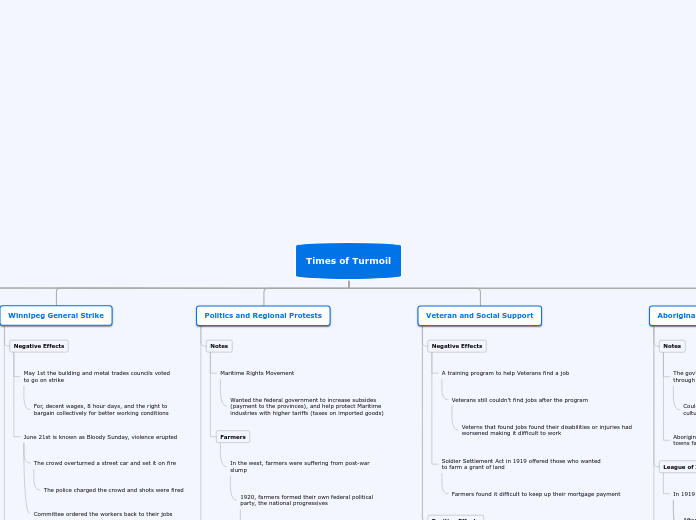Times of Turmoil
Prohibition
Notes
It was point out by women groups that grain
should be used to feed soldiers instead of alcohol
In 1918, the Federal government banned
the production, import, and transportation
of liquor across the country
Positive Effects
Crime rate dropped and drunkenness decreased
Industrial efficiency improved because fewer days were
missed
Negative Effects
Created a new crime: people bought "bootleg liquor"
(illegal liquor made and sold by bootleggers
Connections
Bc of the illegal liquor the Canadian gov't lost a lot of
money
This led to the gov't adding more hours for workers
to earn back the money they lost
Causing the Labour unrest
Economically the gov't was not doing well bc of all the
money they were losing
Influenza
Positive Effects
A federal department of health was created in 1919
Took control over nation concerns (border quarantines
and child welfare)
Took some years before it had a real impact but
Canadians were becoming more aware of public
health concerns
Some communities set up a quarantine
Negative Effects
To stop the spread of the flu many closed schools
and businesses
Connections
Due to the closed schools and businesses this may
have caused the unemployment bc workers were not
working
This event did well Politically bc the gov't kept the health
of the individuals living within the country's borders with
the quarantine
This event probably didn't do well economically bc schools
and businesses closed down
Winnipeg General Strike
Negative Effects
May 1st the building and metal trades councils voted
to go on strike
For, decent wages, 8 hour days, and the right to
bargain collectively for better working conditions
June 21st is known as Bloody Sunday, violence erupted
The crowd overturned a street car and set it on fire
The police charged the crowd and shots were fired
Committee ordered the workers back to their jobs
Connections
This event would not have happened if inflation and
unemployment did not occur.
Also if workers were treated nicely and with respect
For the time during the strike the country probably
didn't do well economically bc workers were not working
and earning money
It also had an crumbling industry
Politics and Regional Protests
Notes
Maritime Rights Movement
Wanted the federal government to increase subsides
(payment to the provinces), and help protect Maritime industries with higher tariffs (taxes on imported goods)
Farmers
In the west, farmers were suffering from post-war
slump
1920, farmers formed their own federal political
party, the national progressives
While they did not last they showed that the
traditional 2 party system was not enough to
represent the diverse concerns of groups across
the country
Connections
The farmers gave a voice to diverse groups across the country
Which is different to when workers were not being heard during the Labour Unrest
Socially, the farmers made the gov't see that they needed
a change which developed the gov't and all farmers
In the future, it would impact more workers/groups
Veteran and Social Support
Negative Effects
A training program to help Veterans find a job
Veterans still couldn't find jobs after the program
Veterns that found jobs found their disabilities or injuries had worsened making it difficult to work
Soldier Settlement Act in 1919 offered those who wanted
to farm a grant of land
Farmers found it difficult to keep up their mortgage payment
Positive Effects
The Pension Act was passed in 1927
British subjects over the age of 70 were entitled to a
pension
Pensioners had to have lived in Canada for 20 years
Anyone who earned more than $365 a year could not
get a pension
Not that positive
Women could only receive a pension if they were a widow
Non-British subjects could not get a pension
Connections
The pension act was not fair and the social support didn't
really help the veterans
Because of the rent and inflation this led to Soldiers
not being able to afford mortgage to farm land
Socially, this event developed the life for veterans, widows and children of veterans
economically, the gov't was doing well with keeping the country out of depression
The gov't was also able to earn money to give enforce
the Pension Act
Aboriginal Political Movements
Notes
The gov't aimed to assimilate aboriginal children was
through residential schools
Could not speak their language or follow their traditional cultural practices
Aboriginal people who tried to live off reserves in Canadian towns faced prejudice
League of Indians
In 1919 a Mohawk veteran organized the League of Indians
After the war the gov’t wanted to enfranchise (the veterans have the right to vote, but only if they give up their status) Aboriginal veterans
In response the gov’t made it illegal for aboriginal to raise funds for land claims + forming organizations
Connections
Because of how unfairly the Aboriginals were being treated
it made them want to fight back and form an organization
This is similar to the strike from the Labour Unrest bc
it all started with unfair situations and workers wanting
to fight back
Politically, the gov't did not protect the rights of the Aboriginals
For example, the right to vote without having their status taken away
Immigration
Notes
During the war Canadians had become more suspicious and less tolerant of “foreigners” and ethnic minorities
Changes to the Immigration Act in 1919 reflected feeling of xenophobia (intense dislike of foreigners)
Compulsory for immigration to pass on English literacy test
BC discrimination was mostly directed against Asians, they were paid lower wages than other workers for the same job
Did not have a right to vote, excluded from most professions
On July 1st 1923, Chinese Exclusion Act passed
Banned all Chinese except students, merchants, and diplomats from entering Canada
Connections
Bc during the Labour Unrest there was already discrimination
towards non-British people. The Immigration Act in 1919 was
not a surprise
Socially, the gov't did not develop the quality of life for immigrants
For example, the Immigration Act did not greatly socially impact Immigrants
